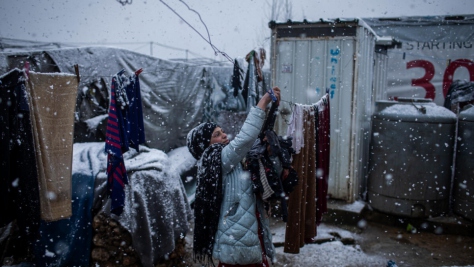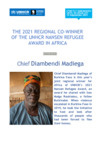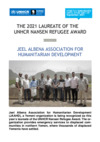Return of 2,400 Somali refugees leads to closing of third camp in Ethiopia
The voluntary return of more than 2,400 Somali refugees last week brings to more than 50,000 the number of voluntary repatriations last year and leads to the closing of a third refugee camp in Ethiopia.

ADDIS ABABA, Ethiopia, Jan. 2 (UNHCR) - The repatriation of thousands of Somali refugees from Ethiopia has continued at a steady pace, reflecting a more stable situation in parts of the east African country and leading to the closing of three of eight refugee camps.
Two convoys last week repatriated 2,412 people from Ethiopia's Daror camp to north-west Somalia, bringing the total number of refugees who returned home in 2001 to 50,216. The latest returnees received a nine-month food ration, plastic sheeting and blankets to help them restart their lives.
The Daror complex, which includes health clinics, schools, water systems and generators, and which once hosted 50,000 refugees, will be handed over by UNHCR to the local community.
Earlier last year, Teferiber and Dawarnaji camps were also closed.
Another estimated 67,000 Somalis who fled following the outbreak of widespread civil war a decade ago remain in five other camps in Ethiopia. More than half are expected to return home by June, but some 30,000 others from southern Somalia cannot be repatriated because the security situation in that part of the country remains unstable.
Related news and stories
Thousands of newly arrived Somali refugees in Ethiopia relocated to new settlement
Samira's Story
Drought brings life-threatening food shortages for refugees in Ethiopia
100,000 new Somali refugees arrive in Ethiopia in the past month, UN and partners are calling for urgent funding
UNHCR teams and partners rush assistance to some 100,000 newly arrived Somali refugees in hard-to-reach area of Ethiopia
As the Horn of Africa drought enters a sixth failed rainy season, UNHCR calls for urgent assistance
-

Refugee Resettlement and Complementary Pathways: Opportunities for Growth
17 Sep 2021 By the end of 2020, 20.7 million refugees had been displaced from their countries of origin and sought protection under the mandate of UNHCR, the UN Refugee Agency. While some may eventually be able to return to their countries of origin or integrate locally into the society of their host country, for the most at risk, resettlement remains a critical tool for addressing their displacement by providing secure legal status and access to fundamental rights in a third country. -

Brief on the 2021 UNHCR Nansen Refugee Award
17 Sep 2021 -

COVID-19 tops list of UNHCR's most underfunded crises in 2021
17 Sep 2021 New report shows UNHCR's pandemic response has received just a third of the funds needed for this year, threatening the health and wellbeing of forcibly displaced people globally. -

UNHCR warns of dire consequences for refugees from COVID-19 underfunding
17 Sep 2021 -

COVID-19 tops list of UNHCR's most underfunded situations in 2021
17 Sep 2021 -

Biography - Chief Diambendi Madiega (2021 Nansen Refugee Award Regional co-winner in Africa)
17 Sep 2021 -

Biography - Ameen Jubran & Jeel Albena (2021 Nansen Refugee Award Laureate)
17 Sep 2021 -

Biography - Dr. Saleema Rehman (2021 Nansen Refugee Award Regional winner in Asia)
17 Sep 2021 -

Biography - Jorge Santiago Avila Corrales (2021 Nansen Refugee Award Regional winner in the Americas)
17 Sep 2021
